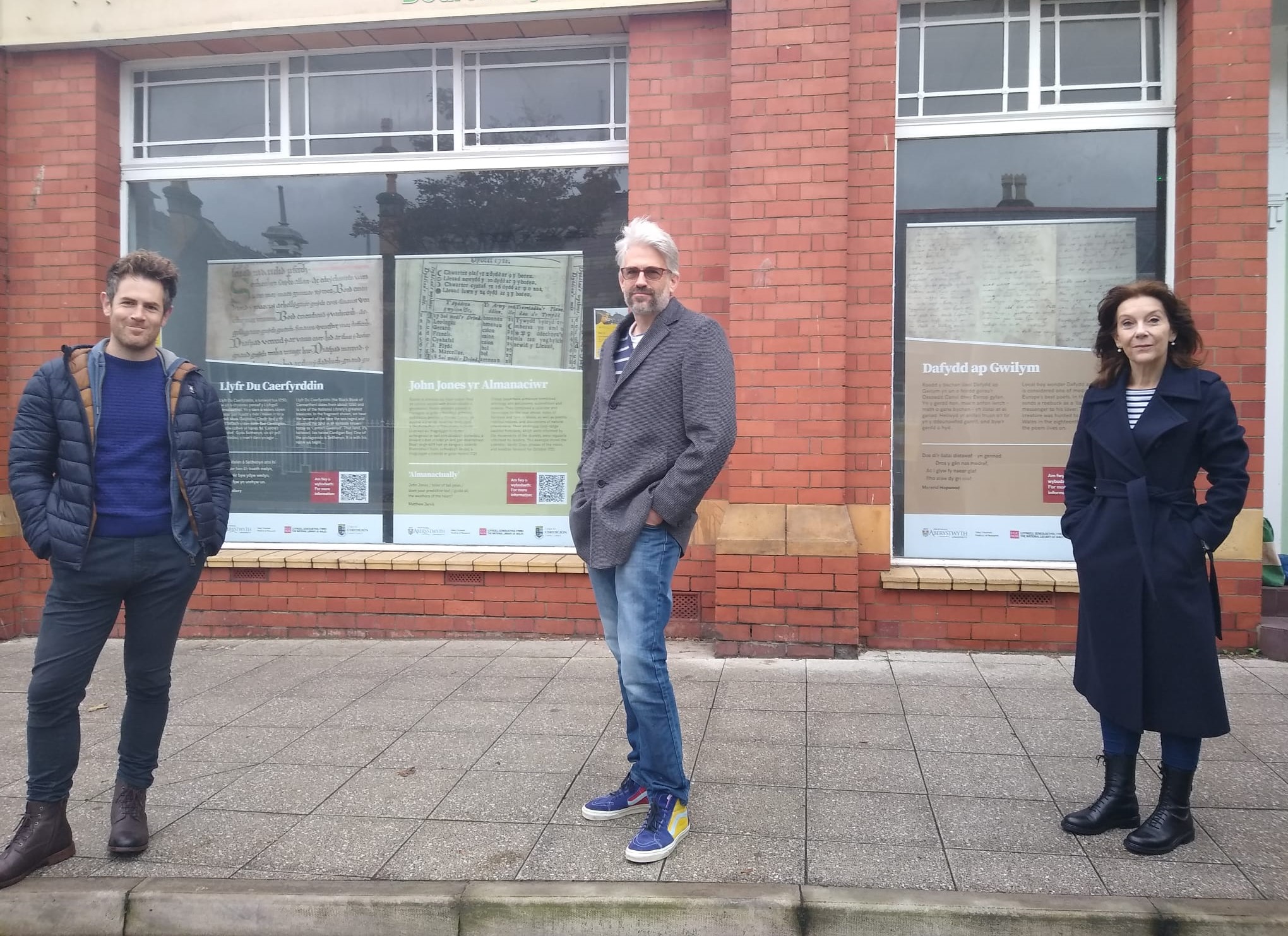Historic manuscripts inspire contemporary climate change poetry

From left to right: Aberystwyth University academics Eurig Salisbury, Professor Matthew Jarvis and Professor Mererid Hopwood outside the old gasworks in the town.
18 October 2021
Three poets from Aberystwyth University have penned a series of poems in response to old manuscripts from the National Library of Wales dealing with the weather and climate change.
The poetry and manuscripts will be displayed online and in a shop window in the centre of Aberystwyth as part of the University’s Festival of Research which starts today (18 October 2021).
The poems for this ‘Words and Windows' project have been composed by Professor Mererid Hopwood and Eurig Salisbury from the University’s Department of Welsh and Celtic Studies, and Professor Matthew Jarvis from the Department of English and Creative Writing.
Mererid Hopwood'senglyn (short Welsh-language verse in strict metre) is a response to a medieval ode by Dafydd ap Gwilym about the roebuck, which was extinct in Wales. Eurig Salisbury’s englyn focuses on the legendary drowning of Cantre'r Gwaelod which features in the The Black Book of Carmarthen. A weather prediction from the Almanac of October 1721 exactly three hundred years ago provides the inspiration for Matthew Jarvis's poem. Professor Mererid Hopwood said: “As members of the University's Creative Exchange we are delighted to be working with the National Library and Ceredigion County Council to try to bring works of the past to the public's attention. They may be centuries old, but they are still relevant today.”
Professor MatthewJarvis, the University’s Creative Exchange Fellow, said:
“Creative practice can help people see the past in new ways, showing material that is hundreds of years old in an exciting new light. It’s also an important way of responding to key contemporary challenges – such as climate change. It can allow us to imagine the futures we might want to reach, and to connect emotionally with those potential futures.”
Pedr ap Llwyd, Chief Executive and Librarian of The National Library of Wales said:
“As a Library we are very proud to be part of this initiative. The National Library of Wales and the collections in its care belong to everyone in Wales and are a valuable resource that allow us to respond positively to contemporary challenges such as climate change. This exhibition is an excellent example of how the past can inspire us today and help us to shape a better future for the people of Wales and the world.”
Councillor Rhodri Evans, Cabinet Member for Economy & Regeneration said:
“We welcome the opportunity to work with Aberystwyth University on plans to introduce ‘Words and Windows’ across the town, and to facilitate the poetry exhibition which has a very poignant message that we can all reflect on - the changes that have occurred and are happening right now due to climate change.”
The ‘Words and Windows’ exhibition will be on display from 18-31 October 2021 in the windows of the old gas showrooms owned by Ceredigion Council in Park Avenue, Aberystwyth, as well as on the University's digital platforms. A poetry stomp based on the weather - 'Talwrn y Tywydd' - will also be broadcast on BBC Radio Cymru on Wednesday 27 October, with a team of current staff from the University competing against a team of former students. The University's free Festival of Researchtakes place from 18-22 October and focuses on climate change issues in the weeks leading up to the UN COP26 Conference.
The Poems
‘Almanactually’
John Jones / teller of tall gales /
does your predictive text / guide all
the weathers of the heart?
Matthew Jarvis
Yr Iwrch
Dos di’r llatai distawaf – yn gennad
Dros y gân nas medraf,
Ac i glyw fy naear glaf
Rho alaw dy gri olaf.
Mererid Hopwood
Cantre’r Gwaelod
Mae’r ddalen â Seithenyn arni hi
Mor hen â’r traeth melyn,
Ond gŵr byw ydyw wedyn,
A gall fyw yn unrhyw un.
Eurig Salisbury



